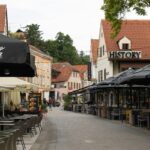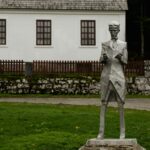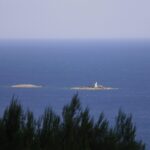ZAGREB, November 8, 2019 – Western Balkan countries, aspiring for European Union membership, are putting their hopes in Croatia’s presidency of the Council of the EU in the first half of 2020, and are hoping that North Macedonia and Albania will be given a greenlight for opening accession talks before the Zagreb summit in May.
These hopes were expressed at a meeting on the European prospects of southeastern European countries in Geneva on Friday. The meeting, organised by the World Economic Forum (WEF), brought together heads of state or government and ministers from Albania, Austria, Bosnia and Herzegovina, Bulgaria, Croatia France, Greece, Hungary, Italy, Kosovo, Montenegro, North Macedonia, Slovakia, Slovenia, Serbia and Turkey.
During the event, Prime Minister Andrej Plenković said that “Croatia intends to help its neighbours” and that it would be ideal to reach a consensus on opening accession negotiations with North Macedonia and Albania by May.
“We are neither excessively optimistic nor enthusiastic. Nevertheless, this process needs to move forward. Without membership prospects we cannot count on accelerated economic development, true democratic values, cooperation, and accordingly, further strengthening of stability and security of our immediate neighbourhood,” said Plenković.
Last month, the European Council failed to agree on opening accession negotiations with Tirana and Skopje, despite the fact that the European Commission gave its greenlight and the fact that a majority of EU member states were in favour of starting the talks. A unanimous decision is required in such cases.
France, as the most vocal opponent to further EU enlargement in the near future, as well as the Netherlands and Denmark withheld their support for the two Balkan aspirants.
North Macedonian Prime Minister Zoran Zaev said in Geneva that a lot of changes had been made in a bid to make progress on the journey towards the European Union.
Zaev put his hopes in Croatia’s EU presidency because it would enable “more focus to be placed on the whole region,” adding that North Macedonia would continue implementing reforms.
Albanian Prime Minister Edi Rama said that they felt as if “they are left without a compass”, underscoring that Albania and its citizens nevertheless wanted EU membership.
Serbian President Aleksandar Vučić said his country was not so optimistic as North Macedonia and Albania, but it would like to be given a clear answer.
Since early 2014, when Belgrade opened accession negotiations, 17 policy chapters have been opened in that process.
One of the conditions for Serbia’s admission to the EU is the normalisation of its relations with Kosovo.
Montenegro’s Vice Premier Zoran Pazin said that his country did not expect the EU to make concessions.
Bosnia and Herzegovina’s Prime Minister Denis Zvizdić said that the EU membership had no alternative.
Zvizdić also commented on French President Emmanuel Macron’s description of Bosnia as a “ticking time-bomb” and the greatest concern for Europe in the Balkans due to the country’s “problem of returning jihadists”.
Zvizdić responded that his country had made great progress in the fight against terrorism and added that in the last three years no Bosnian citizens had gone to wars in foreign countries or participated in terrorist actions.
More news about Croatia and the Western Balkan countries can be found in the Politics section.







